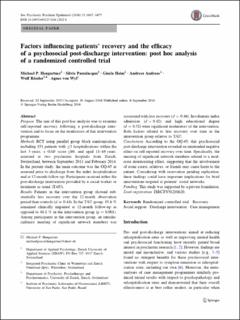Please use this identifier to cite or link to this item:
https://doi.org/10.21256/zhaw-3990Full metadata record
| DC Field | Value | Language |
|---|---|---|
| dc.contributor.author | Hengartner, Michael Pascal | - |
| dc.contributor.author | Passalacqua, Silvia | - |
| dc.contributor.author | Heim, Gisela | - |
| dc.contributor.author | Andreae, Andreas | - |
| dc.contributor.author | Rössler, Wulf | - |
| dc.contributor.author | von Wyl, Agnes | - |
| dc.date.accessioned | 2018-01-29T15:29:34Z | - |
| dc.date.available | 2018-01-29T15:29:34Z | - |
| dc.date.issued | 2016-12 | - |
| dc.identifier.issn | 0933-7954 | de_CH |
| dc.identifier.issn | 1433-9285 | de_CH |
| dc.identifier.uri | https://digitalcollection.zhaw.ch/handle/11475/2258 | - |
| dc.description | Erworben im Rahmen der Schweizer Nationallizenzen (http://www.nationallizenzen.ch) | de_CH |
| dc.description.abstract | Purpose: The aim of this post hoc analysis was to examine self-reported recovery following a post-discharge intervention and to focus on the moderators of this intervention programme. Methods: RCT using parallel group block randomisation, including 151 patients with ≤3 hospitalisations within the last 3 years, a GAF score ≤60, and aged 18–64 years, assessed at two psychiatric hospitals from Zurich, Switzerland, between September 2011 and February 2014. In the present study, the main outcome was the OQ-45 as assessed prior to discharge from the index hospitalisation and at 12-month follow-up. Participants received either the post-discharge intervention provided by a social worker or treatment as usual (TAU). Results: Patients in the intervention group showed substantially less recovery over the 12-month observation period than controls (d = 0.44). In the TAU group, 15.6 % remained clinically impaired at 12-month follow-up as opposed to 48.1 % in the intervention group (p = 0.001). Among participants in the intervention group, an interdisciplinary meeting of significant network members was associated with less recovery (d = 0.46). Involuntary index admission (d = 0.42) and high educational degree (d = 0.52) were significant moderators of the intervention. Both factors related to less recovery over time in the intervention group relative to TAU. Conclusions: According to the OQ-45, this psychosocial post-discharge intervention revealed an unintended negative effect on self-reported recovery over time. Specifically, the meeting of significant network members related to a moderate deteriorating effect, suggesting that the involvement of some carers, relatives, or friends may cause harm to the patient. Considering with reservation pending replication, these findings could have important implications for brief interventions targeted at patients’ social networks. | de_CH |
| dc.language.iso | en | de_CH |
| dc.publisher | Springer | de_CH |
| dc.relation.ispartof | Social Psychiatry and Psychiatric Epidemiology | de_CH |
| dc.rights | Licence according to publishing contract | de_CH |
| dc.subject.ddc | 362: Gesundheits- und Sozialdienste | de_CH |
| dc.subject.ddc | 616.89: Psychische Störungen, klinische Psychologie und Psychiatrie | de_CH |
| dc.title | Factors influencing patients’ recovery and the efficacy of a psychosocial post-discharge intervention : post hoc analysis of a randomized controlled trial | de_CH |
| dc.type | Beitrag in wissenschaftlicher Zeitschrift | de_CH |
| dcterms.type | Text | de_CH |
| zhaw.departement | Angewandte Psychologie | de_CH |
| zhaw.organisationalunit | Psychologisches Institut (PI) | de_CH |
| dc.identifier.doi | 10.21256/zhaw-3990 | - |
| dc.identifier.doi | 10.1007/s00127-016-1282-8 | de_CH |
| zhaw.funding.eu | No | de_CH |
| zhaw.issue | 12 | de_CH |
| zhaw.originated.zhaw | Yes | de_CH |
| zhaw.pages.end | 1677 | de_CH |
| zhaw.pages.start | 1667 | de_CH |
| zhaw.publication.status | publishedVersion | de_CH |
| zhaw.volume | 51 | de_CH |
| zhaw.embargo.end | 2021-12-01 | de_CH |
| zhaw.publication.review | Peer review (Publikation) | de_CH |
| zhaw.webfeed | Klinische Psychologie | de_CH |
| zhaw.funding.zhaw | Poststationäre Netzwerkkoordination (ZInEP) | de_CH |
| Appears in collections: | Publikationen Angewandte Psychologie | |
Files in This Item:
| File | Description | Size | Format | |
|---|---|---|---|---|
| Hengartner2016_Article_FactorsInfluencingPatientsReco.pdf | 572.74 kB | Adobe PDF |  View/Open |
Show simple item record
Hengartner, M. P., Passalacqua, S., Heim, G., Andreae, A., Rössler, W., & von Wyl, A. (2016). Factors influencing patients’ recovery and the efficacy of a psychosocial post-discharge intervention : post hoc analysis of a randomized controlled trial. Social Psychiatry and Psychiatric Epidemiology, 51(12), 1667–1677. https://doi.org/10.21256/zhaw-3990
Hengartner, M.P. et al. (2016) ‘Factors influencing patients’ recovery and the efficacy of a psychosocial post-discharge intervention : post hoc analysis of a randomized controlled trial’, Social Psychiatry and Psychiatric Epidemiology, 51(12), pp. 1667–1677. Available at: https://doi.org/10.21256/zhaw-3990.
M. P. Hengartner, S. Passalacqua, G. Heim, A. Andreae, W. Rössler, and A. von Wyl, “Factors influencing patients’ recovery and the efficacy of a psychosocial post-discharge intervention : post hoc analysis of a randomized controlled trial,” Social Psychiatry and Psychiatric Epidemiology, vol. 51, no. 12, pp. 1667–1677, Dec. 2016, doi: 10.21256/zhaw-3990.
HENGARTNER, Michael Pascal, Silvia PASSALACQUA, Gisela HEIM, Andreas ANDREAE, Wulf RÖSSLER und Agnes VON WYL, 2016. Factors influencing patients’ recovery and the efficacy of a psychosocial post-discharge intervention : post hoc analysis of a randomized controlled trial. Social Psychiatry and Psychiatric Epidemiology. Dezember 2016. Bd. 51, Nr. 12, S. 1667–1677. DOI 10.21256/zhaw-3990
Hengartner, Michael Pascal, Silvia Passalacqua, Gisela Heim, Andreas Andreae, Wulf Rössler, and Agnes von Wyl. 2016. “Factors Influencing Patients’ Recovery and the Efficacy of a Psychosocial Post-Discharge Intervention : Post Hoc Analysis of a Randomized Controlled Trial.” Social Psychiatry and Psychiatric Epidemiology 51 (12): 1667–77. https://doi.org/10.21256/zhaw-3990.
Hengartner, Michael Pascal, et al. “Factors Influencing Patients’ Recovery and the Efficacy of a Psychosocial Post-Discharge Intervention : Post Hoc Analysis of a Randomized Controlled Trial.” Social Psychiatry and Psychiatric Epidemiology, vol. 51, no. 12, Dec. 2016, pp. 1667–77, https://doi.org/10.21256/zhaw-3990.
Items in DSpace are protected by copyright, with all rights reserved, unless otherwise indicated.